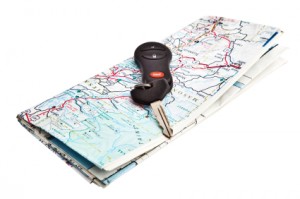
Road Trips: If you are driving, be sure that all five tires are in good repair. Bring extra food, water and blankets in case a break down or weather keeps you from your destination. A flashlight, tow strap, first aid kit and fire extinguisher should be stowed in the trunk. Keep the tank more than half full at all times. Do you have your AAA card with you?
Communications: Check with your wireless carrier to see if there are any “dead zones” along your route. Consider bringing an inexpensive two way radio programmed to the emergency channel as a backup. Let others know of your route and plans. Check in with them from time to time. If travelling abroad, buy a prepaid GSM cell phone when you arrive.
Ground Transport: If you are flying, be sure that you use well-vetted ground transportation. If you arrive at night and take a bus to the rental car lot, ask the bus driver to wait while you load the vehicle and get underway. Remember, the agent will have left your keys and contract in an unlocked car for you after hours. You should also have a printed map with well-visualized directions to get you to the freeway and on to your destination.
Travel Registration: If you are traveling abroad, register your trip with the State Department. Your government cannot be of help to you if they do not know where you are! Also know where the US Embassy is located in the country you are visiting and how to contact them.
Travel Warnings: The State Department also posts region-specific travel warnings.
The use of predatory drugs for robbery, “express kidnappings” and other crime trends are posted.
Hotels Security: Properties with good security and procedures will always indicate your room number to you discreetly and will provide you magnetic key cards that minimize key control issues.
Location: Once checked in, immediately take a hotel business card or book of matches with the hotel address on it and keep it with you.
Instincts & Playing it Safe: Mom, if you are alone or with the children, ask to be escorted to your room. You are not inconveniencing anyone! Better to be safe than sorry. If you are not comfortable with the parking garage layout, drive around to use the valet service.
Room Selection: Try to book a room between the third and eighth floors and close to the elevator banks. Avoid ground floor rooms. If visiting Third World countries, do not book a room above the third floor. Fire trucks, equipment & ladders are not always reliable and a helicopter rooftop rescue is not likely.
Exits & Fire Suppression: On the way to your room, visualize all the exits from your floor. Are there fire sprinklers and smoke detectors in the hallways and in your room? Read any fire emergency documentation the hotel provides and visualize how you would exit the building in an emergency. Point out exits to your children as well.
Hallways, Elevators & Stairwells: Children should not be allowed to play alone in the hallways and need to be accompanied to the ice and vending machines. Teenagers should also use the buddy system. This also goes for riding the elevators and using enclosed stairwells!
Stay Relaxed But Aware: This frame of mind is also known as situational awareness. Be aware of your surroundings on quiet floors, coming and going to the gym or pool, and again, the buddy system cannot be over-emphasized.
Perimeter Control: Be aware that side entrances and stairwells can be very quiet and those that are not controlled by key cards present more opportunity for the criminal element to enter the building or lurk in the quiet periphery.
“I left something in the car”: If you did, do not send one of your children alone to retrieve it. Again, the buddy team is always best practice.
Room Door Policy: Never open the room door for anyone and if traveling with children, book two rooms with an adjoining door if possible. Use the secondary securing latch. If it is a chain, give it one twist to take out the slack. Inexpensive door wedge or personal safety alarms are worth purchasing.
No Surprises: Upon entering the rooms, do a “sweep” and check all possible hiding places. If you return to your room and the door is ajar or unlocked, DO NOT enter. Return to the front desk for assistance.
Be Strategic: Ask which areas of town to avoid and stay in well- lit, busy environments. Avoid doing ATM transactions in public locations especially in developing nations and be discreet with financial transactions especially when dealing with street vendors. Blend in and keep cameras and valuables out of sight. Keeps your distance from armored cars making cash deliveries and pickups at malls and other public areas.
Think Outside the Box: If when abroad, you do get into a disagreement with a vendor and there is a language barrier, be cognizant of maintaining calm body language and composure. This is all observers have to go by to interpret your frame of mind. Calm body language usually prevents unnecessary escalation of a situation.
Contingency Plans: Designate a meeting place if there were a natural disaster, fire or if someone got lost. If your family splits into groups for periods of the day, know each other’s plans and stick to scheduled times to check in with one another.
If you are proactive in all phases of travel planning, you should have a more enjoyable, relaxing and uneventful vacation.
Larry Kaminer
Traveling? Are you Medically Prepared?
Not Traveling this Summer? Some Home Safety Tips.
